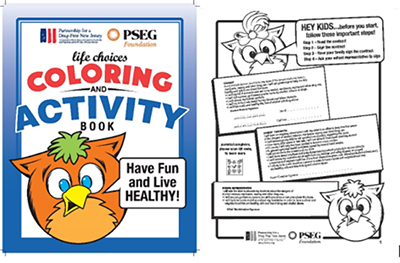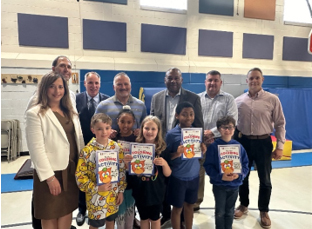Contact Us
To provide feedback on the Community Policing Dispatch, e-mail the editorial board at CPDispatch@usdoj.gov.
To obtain details on COPS Office programs, publications, and resources, contact the COPS Office Response Center at 800-421-6770 or AskCopsRC@usdoj.gov

U.S. Department of Justice
Office of Community Oriented Policing Services
Washington, DC 20530
According to Angelo Valente, Executive Director of the Partnership for a Drug-Free New Jersey (PDFNJ), research shows that kids as young as 5th and 6th grade are being offered drugs and tobacco.
“Hearing that 10- and 11-year-olds were being approached, we realized that prevention needed to start early,” he said. “And looking for an age-appropriate program led us to the development of the Third Grade Life Choices Coloring and Activity Book.”
As part of one of several PDFNJ programs designed to supplement drug-prevention and health curricula in New Jersey schools, these books are a fun and engaging way for young children to not only learn about making healthy choices but also pledge to avoid drugs, alcohol, and tobacco.
In addition to pages for coloring, a crossword puzzle, and other games related to diet, exercise, and drug avoidance, the books include a contract to be signed by the students in which they promise to make healthy life choices.

Children, Parents, and Teachers Sign a Pledge
Said Valente, “We added the contract because we know that 9- and 10-year-olds take signing something like this very seriously.
“And [because] support from their family and teachers is critical to helping children avoid drugs and other problems, the contract has sections for the parents and teachers to sign. In signing, they promise that they can always be turned to if the child has a question about vaping, drinking, or any other unhealthy choice and needs help to avoid it.”
This program, which is supported with funding from the Public Service Enterprise Group (PSEG), an energy company headquartered in New Jersey, provides the coloring and activity books to third graders in 314 schools throughout the state. In many schools, they are given to the children by police officers who provide campus security and sometimes teach drug prevention classes as well.
“We have worked with many local police officers on initiatives over the last three decades,” said Valente. “In this program, officers who are already in schools get actively involved with the students. It’s a great way for them to interact with the kids.”
In Old Bridge Township, New Jersey, Detective Patrick Donofrio of the Old Bridge Police Department (OBPD) Community Policing unit speaks to the children about making good choices while handing out the books in seven of the township’s elementary schools.
“Third grade is a good place to start drug education,” he said. “The kids are most receptive to it at this age. I am amazed at how much they already knew about alcohol, tobacco, vaping, and drugs. And we didn’t want the only information they’re getting about these things to come from older kids.”
Important Conversations Are Started
Detective Donofrio went on, “The things they do in these books reinforce good values and get them talking with their families. This is an excellent way to get the parents’ attention and help them connect with their kids on these topics. Starting these conversations now can open doors for communication in the future.
“The students really like the books because they enjoy coloring and doing the activities. Plus, the books touch on life decisions they understand, like bike safety and getting physical exercise. I know that teachers also like the program, because it gives the kids a chance to learn about healthy choices from somebody they look up to and who is new in the classroom.
“When our officers speak to these children, we tell them that if they are ever approached to try drugs or do anything things else they know is wrong, they can turn to their parents or teachers for help. And they seem to feel reassured that there is a support system around them.”
Added Valente, “We get notes from teachers, saying that the books are wonderful and their students enjoy working on them. They also comment that it’s a good way to teach these things without lecturing, and that the books send an important message to families too.
“As for the contract, the students are excited about signing it. One teacher said that the children felt they were doing something ‘official’ taking the pledge with her. And they were equally excited about doing it again with the grown-ups who sign it at home.”
The Community Works Together for the Children

“This is what makes this program unique and especially impactful,” Valente added. “It extends into the home and requires parents to sign the pledge too. A school officer, teachers, and family members are all actively involved.
“Old Bridge is a great example of everybody—teachers, families, police, school administrators—working together to help our youth make healthy choices and grow up to lead the kind of lives we all hope for them.
“PDFNJ programs start in third grade and continue through high school. But schools don’t always have time to take advantage of all the programs available to them. Detective Donofrio and other OBPD officers make an effort to guarantee that all the programs we provide are reaching our children.
“We owe a lot to the PSEG Foundation, too, because without their support, we couldn’t provide the coloring and activity book program at this ongoing level. Participation has increased by 20 percent since we started it in 2004; 35,000 third graders are now getting the books and signing the contract with their teachers and parents.”
Noting that recent studies suggest that introducing prevention education at an early age plays a role in decreasing the use of alcohol, tobacco, and other substances in later years, he added, “Educating our youth with age-appropriate messages to prevent the misuse of alcohol, tobacco, and other drugs is an ongoing effort.”
Faye C. Elkins
Sr. Technical Writer
COPS Office
Subscribe to Email Updates
To sign up for monthly updates or to access your subscriber preferences, please enter your email address in the Subscribe box.






